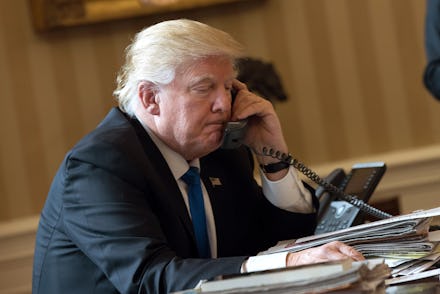The GOP warmed to investigating Flynn and Russia. That just got more complicated for them.

Michael Flynn's resignation, over a phone call with Russia's ambassador to the U.S. Sergey Kislyak, gave Republicans on Capitol Hill an opening on Russia.
Flynn's resignation from his position as President Donald Trump's national security adviser opened the door to calls for an investigation. Not only did Democrats have an obvious hook on which to hang their calls, some Republicans — a few of which had become disquieted about ties between Trump's team and Russia — could focus their energies on someone now outside the White House. That Flynn was a bad apple, not that the administration was a bad bunch, gave Hill Republicans some wiggle room, and they began to writhe through.
Sen. Majority Leader Mitch McConnell acknowledged Tuesday that an investigation into Flynn's ties with Russia was "highly likely."
"I think the fundamental question for us is what is our involvement in it, and who ought to look at it," McConnell said. Other Republican senators, including members of the Senate intelligence committee and the body's ranking member, called for a probe.
Then things changed on Tuesday night. The bad apple dynamic that allowed Republicans to limit the investigation to Flynn got harder to maintain.
The New York Times broke news late Tuesday that Trump's presidential campaign had repeated and widespread contact with Russian intelligence officials. The paper also noted that the ties were not limited to the campaign itself; others in Trump's orbit had contact with Russian officials, not all of them spies.
That means an investigation into team Trump's Russian ties just got more politically fraught for those Republicans who opened the door to an investigation. The dots are beginning to connect, with the latest New York Times report starting to fill in the lines between Russia's election hacking (which Congress is already probing) and Flynn's alleged contacts with Kremlin officials during the transition period.
Still, Republicans have some wiggle room to get back out.
House Speaker Paul Ryan was never hot on the idea of a probe; he declined Tuesday to call for an investigation into Flynn. And Rep. Jason Chaffetz, who chairs the House oversight committee, hinted that Flynn's resignation closed the case. "It's taking care of itself," he said.
At least one House Republican even suggested Congress should look into the source of leaks — not Flynn's connections to Russia. Republican Sen. Richard Burr, chair of the Senate intelligence committee, did say he would investigate connections between Trump campaign officials and the Russians — but that was before the New York Times story broke.
One option for Republicans: Deny, deny, deny. Michael Caputo, a confidante of former Trump campaign chief and consultant to autocratic leaders Paul Manafort, told Mic Tuesday night that the stories of Russian ties simply aren't true. "This story is total bullshit," he said in a phone interview. "These sources are lying and the Times is printing fake news." By ignoring the reports — and further leaks from current and former U.S. officials — the GOP could pursue an inquiry into Flynn without theoretically hurting Trump.
That might work, and it might not. Within hours of the initial calls from Republicans to dig into Flynn's background, the timeline of the former national security adviser's dismissal had muddied the situation. Trump appears to have misled the press about when he knew Flynn lied. Republicans looking to do a limited investigation into Flynn can't predict what comes out, and the Trump administration's own erratic disclosures could end up being what forces the GOP to widen any probe.
With the breakneck pace of Trump administration crises, it shouldn't be too long before we figure out which way this thing goes.